Campus News
UCSC delegation brings green tips to Taiwan
A green delegation, including two UCSC undergraduates and UCSC sustainability director Aurora Winslade, traveled 6,449 miles to Taiwan, where they led a two-day workshop on June 29 and 30 for the Taiwan Green University Program
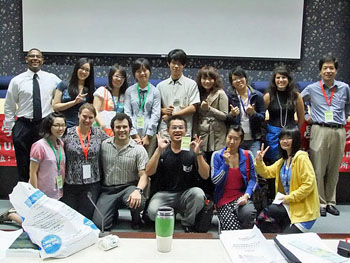
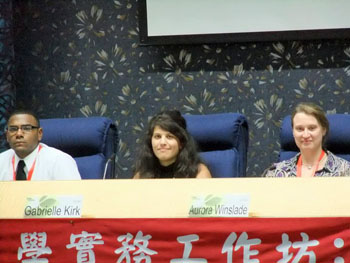
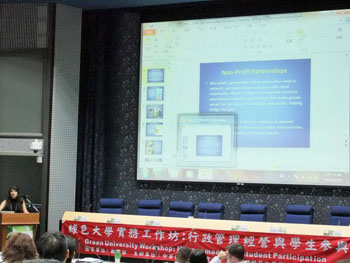
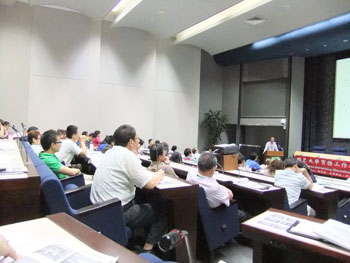
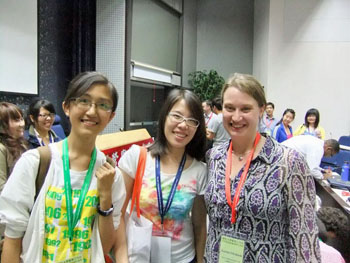
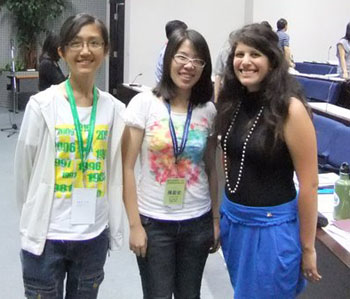
Three of the most influential leaders of UC Santa Cruz’s campus sustainability movement expanded their vision to the Far East this summer.
The green delegation, including UCSC undergraduates Gabi Kirk and Cameron Fields, and UCSC sustainability director Aurora Winslade, traveled 6,449 miles to Taiwan, where they led a two-day workshop on June 29 and 30 for the Taiwan Green University Program.
“I think we learned as much as we shared,” Winslade said. “It’s a testament to the strength of our student movement and the young leaders at UCSC that we were selected for this program.”
Kirk co-chairs UCSC’s Student Environmental Center. Fields chairs UCSC’s Carbon Fund, which supports and oversees carbon-reduction projects undertaken by students, staff and faculty on and off-campus.
The group of visitors also included a staff member from the University of California Office of the President, and a staff member from New York University.
The workshop, held at the National Taiwan Normal University (NTNU) in Taipei, drew a healthy response; 158 Taiwanese students, faculty, staff and administrators from universities across Taiwan signed up for the conference.
The conference covered topics including energy efficiency, sustainable food systems at UCSC, NYU and the UC system.
Speakers placed a special focus on student engagement in Taiwan, an island located off China’s southeastern coast; undergraduates were challenged to take leadership roles in campus environmental efforts.
The visit was well timed. Ecology minded practices and ‘green’ movements have gained momentum in Taiwan in recent years. In June, the New York Times ran a story entitled “Activism Gets Rolling In Taiwan”, detailing the ways environmental groups have been taking action and gaining influence. Among their recent gains: Taiwan’s President, Ma Ying-jeou, recently rejected a proposal for a $24.1 billion petrochemical factory in the west coast of Taiwan.
According to the article, well-organized grassroots efforts, and a growing environmental consciousness, combined with Taiwan’s current status as an economic powerhouse, have made its government and businesses more receptive to green thinking.
“… the people of Taiwan can now afford to oppose new factories, and government officials are balancing the views of companies with the concerns of an environmental movement.. ‘’ the Times reported.
“Taiwan has a very high rate of ecological literacy,” said Kirk. “They shared that nearly 95% of their population believes in global warming, and many government officials receive environmental training.”
Democracy is fairly new in Taiwan; its first presidential elections were held in 1996. But Kirk said many professors and staff members at the conference were “incredibly enthusiastic and optimistic” about the student leadership and activism model that is common at U.S. universities.
This trip has been in the works for nearly a year and a half. The seeds of this journey were planted in January 2010 when Shin-Cheng Yeh, director of the Graduate Institute of Environmental Education (GIEE), visited UCSC to learn about the campus’s sustainability initiatives.
“[When I returned to Taiwan,] I told them how students at UCSC have been doing such great works,” Yeh remarked. “Your professionalism and enthusiasm in campus sustainability impressed me a lot.”
This year, Yeh extended the invitation for UCSC to visit his campus to engage with a wider audience about our programs. The Taiwan Ministry of Education funded the delegation’s airfare and lodging.
“It was an honor to represent UCSC student leaders and share our passion for environmental advocacy,” said Kirk. “I was also impressed by the efforts of Taiwanese university students at their home campuses and the programs already in place.”
The visitors and the conference attendants found common ground.
“Some of the struggles they shared are ones we have conquered or are still working through on our campus,” Kirk said.
Kirk hopes to grow this partnership beyond the trip by setting up regular videoconferences for UCSC and Taiwanese sustainability student leaders to share project ideas and share feedback.